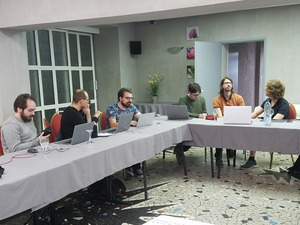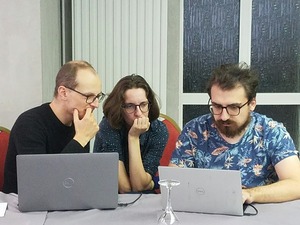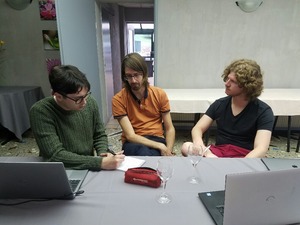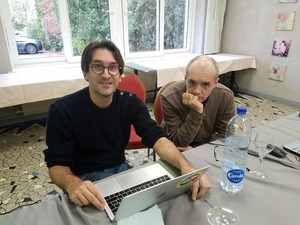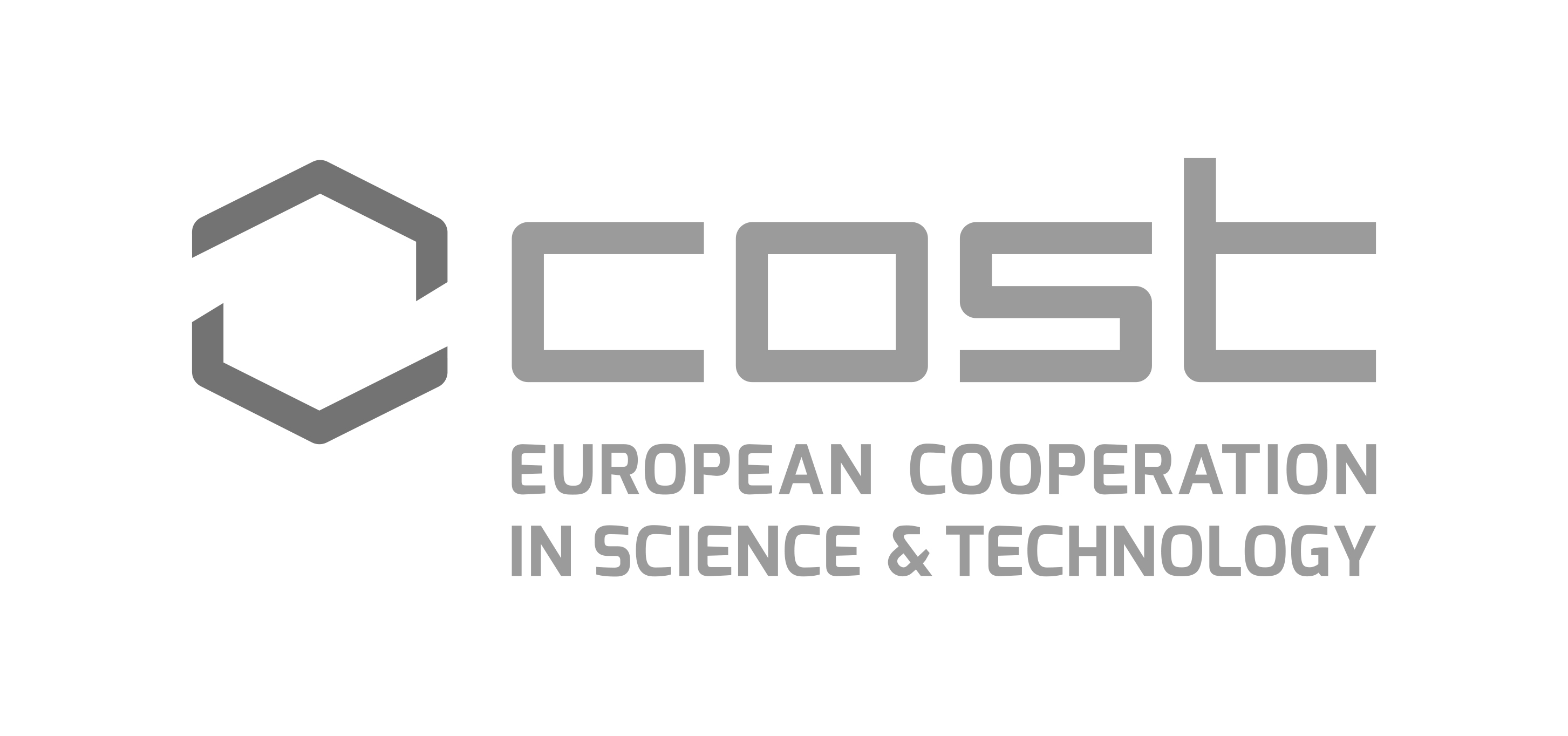Dedukti tools developers meeting 1
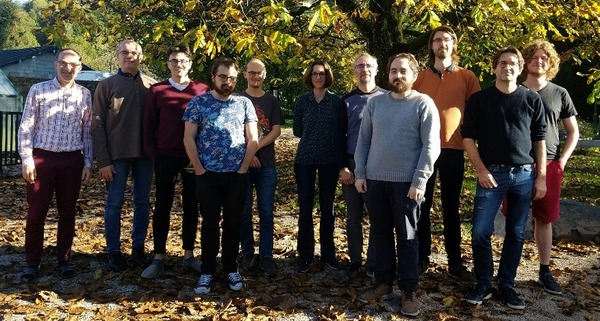
Date: 16-18 October 2022
Venue: La Résidence, 5 rue des Mousses, 88340 Le Val d’Ajol, France
How to get there? There are direct trains from Paris to Remiremont train station (East of France). A shuttle will be organized from Remiremont train station and the hotel on October 15 at 15:30, and from the hotel to Remiremont train station on October 19 at 15:00. If you want to take the shuttle, send a mail to Frédéric Blanqui.
Programme: Working in small groups on the development of tools for generating, handling or transforming Dedukti files.
Registration: Deadline: 18 September 2022. The number of participants is limited. If you want to participate, please contact Frédéric Blanqui. The cost of accommodation and meals is 134 euros/day/person. EuroProofNet can reimburse a limited number of people only. Check eligibility rules and reimbursement rules to get more details.
Organizer: Frédéric Blanqui
Participants: Frédéric Blanqui, Michael Färber, Jesper Cockx, Thiago Felicissimo, Predrag Janičić, Julien Narboux, Théo Winterhalter, Claude Stolze, Amélie Ledein, François Thiré, Bruno Barras, Gilles Dowek
-
Thiago Felicissimo worked on improving agda2dedukti, with the help of Jesper Cockx. He continued his work on the compilation of pattern-matching to eliminators, and more precisely implemented the generation of the Below construction for datatypes, which is needed to compile recursive calls (see Jesper’s PhD thesis for more details). Moreover, thanks to a flag added to Agda by Jesper, the translator can for the first time run on the main branch of Agda, without any special changes needed. Finally, he also worked on solving errors in the translation of the Agda standard library. Thiago and Jesper found a bug in the Agda code which has been corrected by Jesper. The changes to Agda2Dedukti can be found here.
-
Jesper Cockx worked on a prototype formalization of Canonical Dedukti (name subject to change) in Lambdapi. He added benchmarking capabilities to Agda’s conversion checker in order to get an idea of how often eta-equality is actually used in the standard library. He fixed an internal error in the Agda API that was causing problems for Agda2Dedukti. He also helped Thiago with his work on Agda2Dedukti, and in particular on translating pattern matching to eliminators.
-
Frédéric Blanqui merged in the Lambdapi standard library the work of Quentin Buzet on the formalization of the Coq SSReflect libraries ssrnat on natural numbers and seq on polymorphic lists. He also merged the formalization of binary integers of Quentin Garchery, after having removed its dependency to the calculus of constructions: the formalization is now in first-order logic. Frédéric also worked with Julien Narboux and Predrag Janičić on the representation in Lambdapi of the proofs of coherent logic. Finally, he worked on isabelle_dedukti too.
-
Théo Winterhalter worked with Jesper Cockx on describing an alternative description of Dedukti inside Lambdapi itself. This work on design was also about understanding both Dedukti and Lambdapi both as tools and theories.
-
Michael Färber and François Thiré worked on the definition of a Dedukti standard. Dedukti is a language which is implemented by three various active tools: Lambdapi: a proof assistant on top of Dedukti implemented in OCaml, dkcheck: the original checker for Dedukti implemented in OCaml, Kontroli: another type checker for Dedukti implemented in Rust. Each of those three languages recognizes a common subset of the language. The purpose of the first version of the standard is to have a language which is compatible with the three versions. Taking the interesection of the three languages recognized by those tools is not enough. The rationale behind this first version of the design is made so that it is easy to modify the existing tools to make it compliant with the standard. The standard specifies both syntactic rules and semantic rules for the Dedukti language. This should also help the translation of tools to Dedukti because targetting the standard will be enough to get programs/proofs that can be interpreted the the three tools.
-
Claude Stolze started working on an specification of the underlying set theory of the B method. The first goal of this work is to give a clear understanding of this typed set theory and to see how to formalize its structure into the Dedukti system.
-
Predrag Janičić and Julien Narboux worked on exporting coherence logic (CL) proofs to Dedukti. larus is an automated theorem prover based on coherent logic. It is not as efficient as state of the art FOL provers, but it can generate somewhat readable proofs and formal proofs in Coq which are also readable and maintainable. They considered exporting from Larus to Dedukti. It should be a way to transfer automatically generated proofs to several proof assistants using Dedukti technology. Along that way, they want to keep the structure and readability of the proofs. A first idea could be to translate to FOL, but this consists in generating a big lambda term, which contains too much details and that we could obtain also via Larus2Coq export, and then export from Coq2dk. Another way to export from Larus to other proof assistants is to write directly the translators in Larus. For Lean, we could use Verbose Lean as a target whose syntax is very close to Larus’s natural language proofs and very readable. The drawback is that the syntax is not standard and may be not maintained in the future. Another drawback of this approach is that the code cannot be shared between different CL provers (but there are not so many CLprovers). So another direction is to define a deep embedding of CL in Dedukti. We cannot use the same approach as the encoding of FOL into Dedukti, because the FOL encoding does not use explicit contexts, which seems to be essential to keep the spirit of CL. They have defined the syntax of CL in Lambdapi. The open question is how to finish the definition of the inference rules.
-
Amélie Ledein worked on documenting, simplifying, refactoring and making more modular the code of the translator from Metamath to Dedukti. She also worked with Michael and François to elaborate a grammar of the Dedukti standard.
-
Bruno Barras worked on the performance analysis of an implementation of a call-by-need reduction machine in Lambdapi. Although it outperforms the current implementation on examples that benefit from sharing, it is twice as slow on common tests. It appeared that the overhead comes from two factors: excessive use of Ocaml’s generic comparison and garbage collection. The first factor could be adressed by using hashtables. The second factor requires a more precise analysis of the memory allocation strategy.
Lunches and dinners
All meals will be taken at the restaurant of the hôtel except the dinner on Sunday 16 October which will be at the Restaurant du Sô, 400 m from the hotel La Résidence.
Sunday 16 October:
| 08:00-08:30 | breakfast |
| 08:30-10:30 | work session 1 |
| 10:30-10:45 | coffee break |
| 10:45-12:45 | work session 2 |
| 12:45-14:00 | lunch |
| 14:00-16:00 | work session 3 |
| 16:00-16:15 | coffee break |
| 16:15-18:15 | work session 4 |
| 18:15-19:30 | free time |
| 19:30-21:00 | dinner |
| 21:00-23:00 | work session 5 (optional) |
Monday 17 October:
| 08:00-08:30 | breakfast |
| 08:30-10:30 | work session 1 |
| 10:30-10:45 | coffee break |
| 10:45-12:45 | work session 2 |
| 12:45-14:00 | lunch |
| 14:00-16:00 | work session 3 |
| 16:00-16:15 | coffee break |
| 16:15-18:15 | work session 4 |
| 18:15-19:30 | free time |
| 19:30-21:00 | dinner |
| 21:00-23:00 | work session 5 (optional) |
Tuesday 18 October:
| 08:00-08:30 | breakfast |
| 08:30-10:30 | work session 1 |
| 10:30-10:45 | coffee break |
| 10:45-12:45 | work session 2 |
| 12:45-14:00 | lunch |
| 14:00-16:00 | work session 3 |
| 16:00-16:15 | coffee break |
| 16:15-18:15 | work session 4 |
| 18:15-19:30 | free time |
| 19:30-21:00 | dinner |
| 21:00-23:00 | work session 5 (optional) |
Wednesday 19 October:
| 08:00-08:30 | breakfast |
| 08:30-10:30 | work session 1 |
| 10:30-10:45 | coffee break |
| 10:45-12:45 | work session 2 |
| 12:45-14:00 | lunch |
